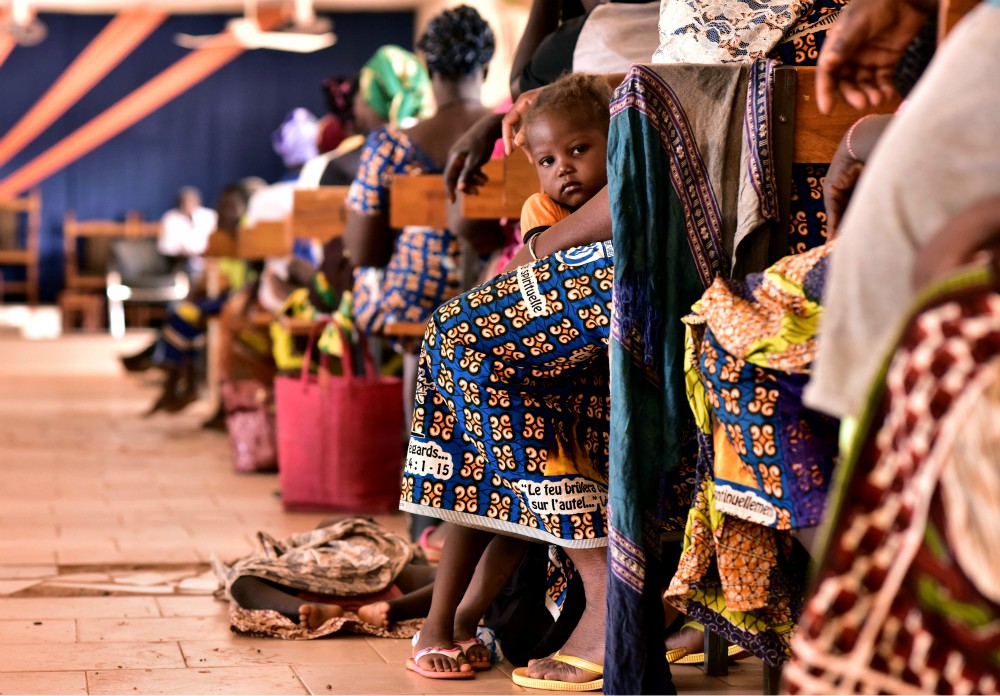
Displaced Christians attend a church service in Kaya, Burkina Faso, May 16, 2019. (CNS/Reuters/Anne Mimault)
As the coronavirus threatens new social and economic dislocations across Africa, it will be but one more complication in the continent's francophone Sahel region, which faces a campaign by Islamist militants seeking territory that increasingly is targeting Christian communities in the area.
The campaign is most intense in three countries — Mali, Niger and Burkina Faso — located in the central to western portion of a narrow band of territory called the Sahel that stretches across the continent from the Atlantic Ocean to the Red Sea. It is an area of climate transition between the northern desert portion of the continent and the southern portion.
With Christian communities increasingly targeted, aid agencies are warning that instability could soon engulf other countries, too.
"Violent groups throughout the region are taking advantage of weak or nonexistent governance structures and porous borders," explained Michael Stulman, a manager with the U.S. charity Catholic Relief Services.
"The international community must work with national governments to implement a bold plan to end violence and suffering, and to support long-term development to keep the violence from spreading."
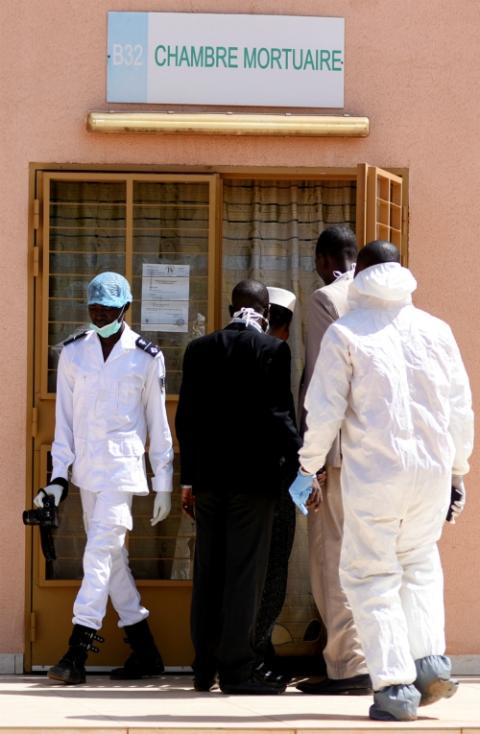
Forensic experts and medics are seen at the door of the morgue of the Bogodogo District Hospital in Ouagadougou, Burkina Faso, where bodies had been registered after an attack in November 2019. Hundreds of thousands of people have been forced out of their homes in Burkina Faso as Christian communities are targeted in a spiral of Islamist killings. (CNS/Reuters/Anne Mimault)
The Senegal-based expert spoke as attacks continued over a wide swath of the Sahel, prompting appeals by Catholic church leaders for more decisive moves to secure order and stability in a region now facing additional ravages from the COVID-19 pandemic.
Stulman told NCR that the violence required "a regional, if not global, response."
"These three countries are at the center of the conflict — but recent attacks along the borders between Burkina Faso and Benin, Ivory Coast and Ghana highlight risks the violence could spread throughout West Africa," Stulman added.
"Insecurity is a reality for all humanitarian workers and it's becoming increasingly challenging to reach vulnerable populations. If the violence continues unabated, we can expect the numbers of displaced to rise dramatically. We're likely to see development gains and economic growth moving backwards."
Warnings have mounted about instability in the Sahel, which Islamist groups driven out of North Africa and the Middle East appear to have identified as a weak link in the anti-terror front, where bases could potentially be secured across an arc of territory from Mauretania to Sudan.
In early March, military commanders from France, the main former colonial power, claimed to have driven the Islamists back, and pledged "massive new deployments" in co-operation with local governments.
But with more than 4,000 lives lost to violence in the region last year, according to United Nations data, counter-campaigns by national armies have been marred by poor equipment and human rights violations.
In February, Senegal's Catholic Caritas organization, headed by Bishop Jean-Pierre Bassène, warned that 7.2 million people needed "immediate help" against an "upsurge in armed attacks, poorly supervised migration, and an increase in food insecurity," as well as continuing outbreaks of Ebola.
Meanwhile, the ecumenical charity Open Doors included several Sahel countries for the first time in its annual report on the persecution of Christians, citing repeated violence by 27 separate Islamist groups.
Advertisement
In Niger, a member of the Society of African Missions, Fr. Mauro Armanino, told the Vatican's Fides agency that Catholic communities were being terrorized close to the capital Niamey, and Christians driven out in a bid to create a "jihadist dictatorship."
In October 2017, four U.S. special forces soldiers were killed at Tongo Tongo in an ambush by fighters with the Islamic State in the Greater Sahara. In December 2019, 71 Niger troops perished in an attack by the same group on an army base at Inates.
Displacement and fatality rates have been worst in Burkina Faso, which is estimated to be 60% Muslim but largely governed by Christians, fueling feelings of disenfranchisement.
Last July, Burkina Faso's president, Roch Marc Christian Kaboré, signed a 19-point accord with the Vatican, guaranteeing the Catholic Church's juridical status and public activities.
But since the 2014 ouster of President Blaise Compaoré, Islamist attacks on Christians have increased steadily, prompting the country's Catholic bishops to dedicate Burkina Faso to the Immaculate Heart of Mary this February.
A February statement from the U.N. refugee agency said more than 4,000 people were now fleeing their homes daily in Burkina Faso, with 150,000 "terrified" residents uprooted in February alone by "killing, raping, and pillaging."
Armed violence had reached "unprecedented levels" in the border areas of Burkina Faso, Mali And Niger, another U.N. report said, leaving 3.7 million people facing food insecurity. Assailants were directly targeting "critical services," with 3,600 schools and at least 240 health centers no longer operating.
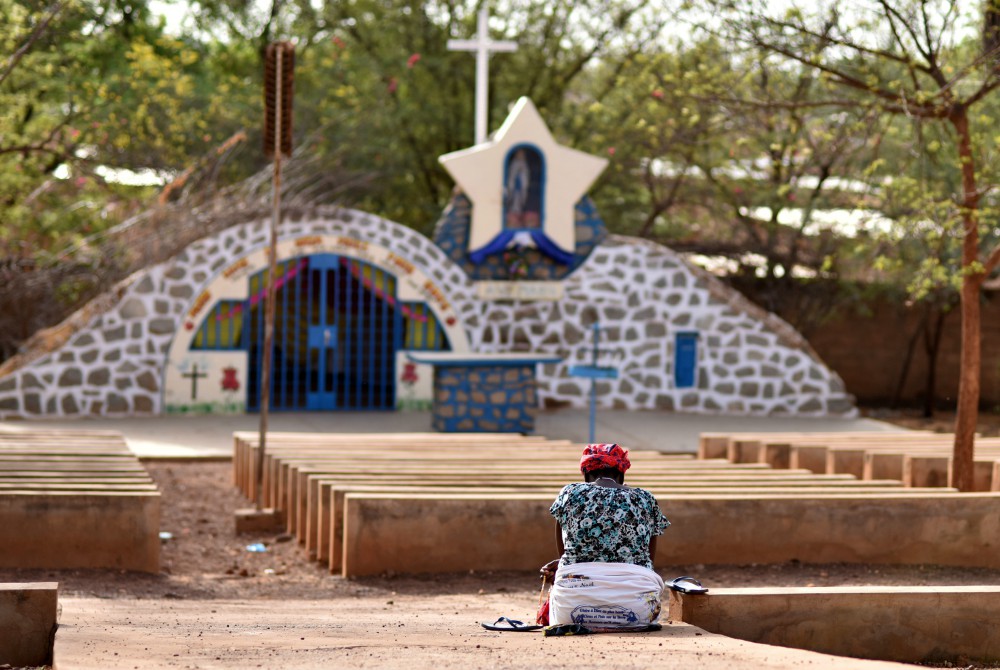
A displaced Christian woman prays in front of a grotto with a statue of Mary in Kaya, Burkina Faso, May 16, 2019. (CNS/Reuters/Anne Mimault)
Even without the violence, Burkina Faso is home to some of the world's poorest communities, with many facing chronic food shortages and unemployment, as well as climate change and environmental degradation.
Although local interfaith ties have traditionally been good, experts say armed groups are exploiting the harsh conditions to incite communal hostilities.
"The terrorists are preying on strains in some communities, attacking places of worship belonging to both faiths and seeking to bring down Christian and Muslim community leaders, since they're the ones speaking out and leading their people to stand up to extremism," one aid worker, who asked not to be named, told NCR. "They've also integrated themselves into local communities, making it hard to track them down."
In December 2019, a newly built Protestant church was attacked by armed men on motorcycles at Hantoukoura, in eastern Burkina Faso, leaving 14 dead, while in February Islamists stormed a church in the town of Sebba, abducting and murdering a Protestant pastor and four congregation members.
The Vatican's Fides News Agency reported that Catholics had been among at least 24 killed when attackers opened fire on a prayer meeting at nearby Pansi on Feb. 16. It said the Catholic church's northern Dori Diocese, established in 2004, had now closed down three of its six parishes "due to terrorism."
In a personal appeal last July, Dori Bishop Laurent Birfuoré Dabiré, who also heads the Bishops' Conference of Burkina Faso and Niger, called for a ban on weapons supplies and on outside support for jihadists, warning they could "eliminate the Christian presence completely" if the world "continued to do nothing."
This February, the Burkina-Niger conference confirmed the church throughout the Sahel faced a "critical situation," with dozens of Catholic parishes, schools and dispensaries forced to close because of the "widening field of action of terrorism."
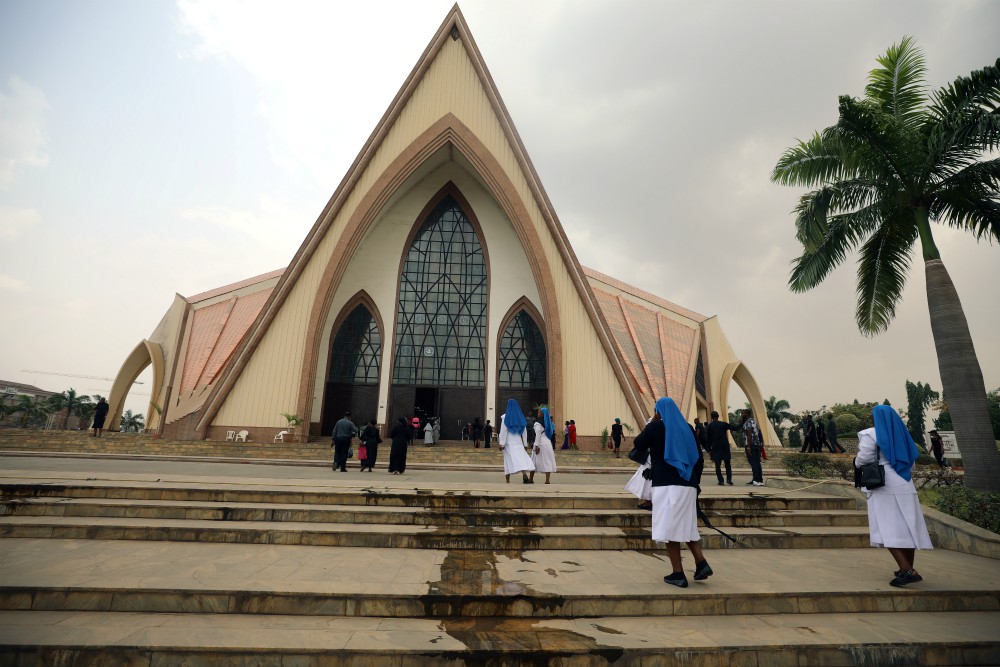
Nuns enter a church in Abuja, Nigeria, ahead of a protest over unending killings of Nigerians March 1. Nigerian bishops called on the international community to help the West African country in its fight against ethnic insecurity and terrorist groups such as Boko Haram. (CNS/Reuters/Afolabi Sotunde)
Part of the impetus for the Islamist campaign has come from Nigeria, where the Boko Haram movement has spread destruction and terror over the past 12 years.
In March, Nigeria's Catholic bishops led a demonstration in the capital, Abuja, accusing the federal government of insensitivity to the repeated atrocities, and urging the international community and Western media to react more effectively.
"We have embarked on a peaceful protest on behalf of over 50 million Catholics and over 100 million Christians in Nigeria," declared the bishops' conference president, Archbishop Augustine Akubueze of Benin City.
"There have been too many mass burials, too many kidnappings ... invasions of people's homes, invasions of sacred places."
Since proclaiming an alliance with Islamic State in 2015, Boko Haram has extended its activities into neighboring Cameroon, targeting Catholic clergy and killing hundreds of police, troops and civilians in the country's Extreme North province.
At least 2,000 people have been killed and 400,000 displaced during a separate conflict in Cameroon's Anglophone regions, where separatists declared an independent state, "Ambazonia," in October 2017, triggering a bloody counter-offensive by forces loyal to President Paul Biya. Inevitably, such conditions have helped Islamist insurgents to strengthen their foothold.
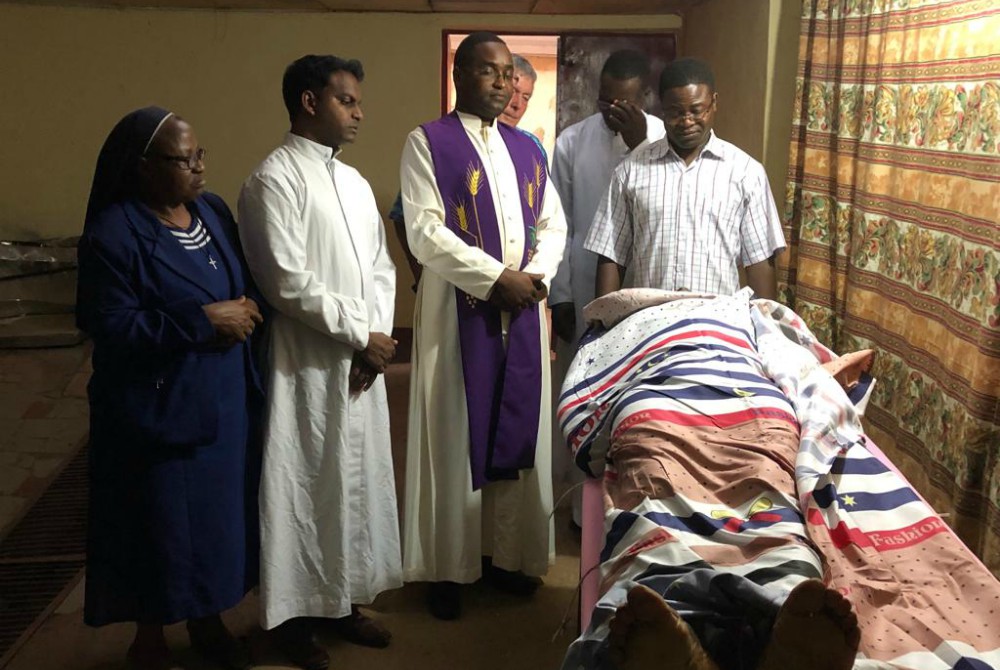
Fr. Richard Njoroge, in purple stole, and others pray over the body of Kenyan Mill Hill Fr. Cosmas Omboto Ondari, parochial vicar of St. Martin of Tours Parish in Kembong, Cameroon, who was killed Nov. 21, 2018, outside his church. (CNS/Courtesy of Mill Hill Fathers)
In late March, the Vatican's Fides News Agency said Boko Haram had stepped up attacks, using the chaos and dislocation caused by the COVID-19 pandemic, and killing at least 50 Nigerian soldiers during an assault on a federal army base in Yobe.
In neighboring Chad a day later, a seven-hour battle with Islamists in the southern Lac province left more than 90 government troops dead, with plans and tanks destroyed by Boko Haram's heavy weapons.
Christians have complained of being forced from public life in predominantly Muslim Chad, under a revised constitution that extended the powers of 30-year President Idriss Déby and required all office-holders to take an Islamic oath.
"The Chadian people's history has never been a haven of peace — but this has never been a reason for our church to stop announcing God's closeness and grasping the glimmers of hope offered by the Christian message," one senior church source, who asked not to be identified for fear of retribution, told Catholic News Service.
"The situation is now critical, as the great powers show complicity by turning a blind eye to violations of basic human rights. What will now become of the many Chadians who are neither Muslims nor Christians? What will be purpose of our institutions of justice and regulation?"
The Catholic Church, established in the country in the 1930s, accounts for just 7% of Chad's 3.7 million inhabitants, and is concentrated in the south with an archdiocese based in the capital, N'Djamena.
The new constitution, which also permits the Muslim practice of "diya," or blood money for families of murder victims, was voted through in April 2018 by Chad's government-controlled National Assembly, despite warnings by the Catholic Bishops' Conference of Chad that it risked "inter-communal bitterness" and a "grave perversion of democratic rules."
Threats beyond the Sahel
Central African Republic — Where the Catholic church's nine dioceses make up a third of the 4.5 million-strong population, a Muslim-dominated rebel force, Seleka, briefly seized power in 2013, triggering a seven-year conflict that has left a million internally displaced and 400,000 seeking refuge abroad.
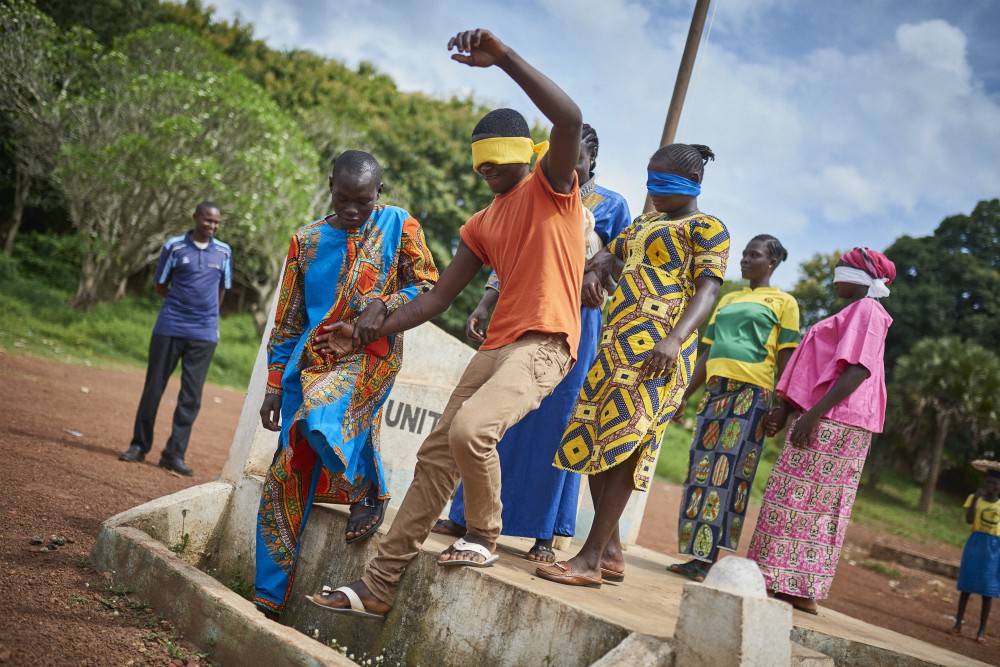
Muslim and Christians take part in a trauma-healing workshop run by Catholic Relief Services and partners in Boda, Central African Republic, Sept. 13, 2019. (CNS/Courtesy of CRS/Sam Phelps)
In January, the Central African Republic's Catholic bishops, headed by Cardinal Dieudonné Nzapalainga, called on the government of President Faustin-Archange Touadéra to reopen dialogue with opponents for "consensual, peaceful solutions."
However, they warned the country faced a "magnitude of challenges," including the "manifest intentions" of some armed groups to set up their own administrations and boycott a February 2019 peace accord, brokered in Sudan.
Democratic Republic of Congo — The church's bishops have deplored the continuation of "corruption and misappropriation" a year after the long-entrenched President Joseph Kabila was replaced in elections by Felix Tshisekedi. In an early March statement, the bishops said "worrying tension" within Tshisekedi's coalition government was undermining security and "the functioning of the state apparatus."
The Catholic Church, accounting for two-thirds of Congo's 67.5 million-strong population, has long demanded peace and stability in the country, where priests have been attacked and abducted.
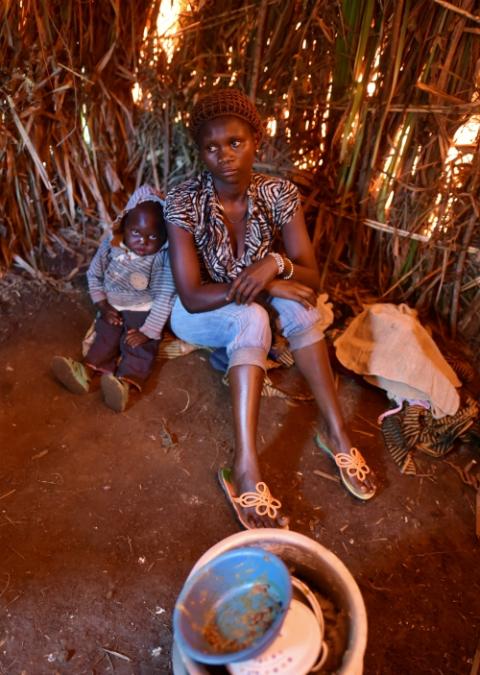
An internally displaced Congolese woman and her child sit inside a makeshift shelter at a camp for victims of ethnic violence in Ituri, Congo, June 24, 2019. (CNS/Reuters/Olivia Acland)
Cardinal Fridolin Ambongo of Kinshasa and other bishops have also cautioned of foreign infiltration of the Congolese army, citing evidence that people of Rwandan and Ugandan origin were being settled in homes forcibly abandoned by the native population.
"We've nothing against the new authorities marking their first anniversary in office — what preoccupies the church is how to bring peace to those areas where war continues, and how to end the killings and massacres so people can live safely again," Msgr. Andre Massinganda, deputy secretary-general of the National Episcopal Conference of the Congo, told CNS in January.
"We've been in a state of war for 20 years now, and while there've been moments of relative calm, the country has never been under control. The church's message will always be the same: Innocent people cannot go on forever paying such a heavy price for the insecurity reigning here."
In February, the Regional Episcopal Conference of West Africa (RECOWA) warned that upcoming elections in several countries would require "wisdom and the spirit of responsibility" when many faced "a loss of their cultural and ancestral heritage, displacement, unemployment, famine, exodus, migration, etc."
"The time has finally come to give the world another face of our experience of democracy: that of maturity through bloodless elections ... and the verdict accepted by all."
Yet even at this level, the signs are mixed.
Ivory Coast — The Episcopal Conference of the Ivory Coast has warned of civil war in the run-up to presidential and parliamentary elections in October, without urgent action to withdraw weapons and ease communal tensions.
Catholics make up nearly one-fifth of the 24 million inhabitants of Ivory Coast, which is home to 15 dioceses and the world's largest Catholic basilica in the capital, Yamoussoukro. Muslims are around 35% of the population.
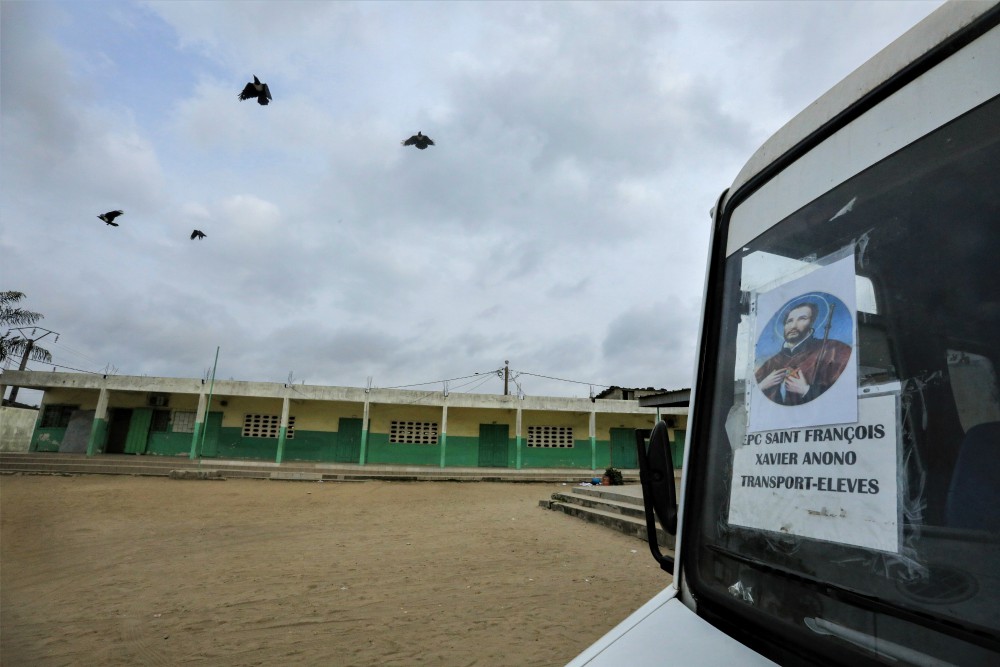
Birds fly above an empty St. Francis Xavier Catholic School during the coronavirus outbreak March 19 in Abidjan, Ivory Coast. (CNS/Reuters/Thierry Gouegnon)
President Alassane Ouattara, who now faces retirement, gained power in 2010 after a civil war that left more than 3,000 dead and half a million displaced. Islamist militants have since targeted the country and exploited communal tensions, such as at Béoumi in May 2019, when curfews were imposed and police reinforcements deployed after clashes left 16 dead and more than 100 injured.
"Forgiveness liberates us from the resentments, hatred and vengeance which lead to death — given the crisis and mistrust affecting us today, it offers a chance for looking to the future together with optimism," Ivory Coast's Catholic bishops noted in an appeal last summer.
"Certainly, building peace is not an easy task. Nevertheless, we demand with insistence from those who hold our people's destiny in their hands: avoid another war!"
Togo — A long-running crisis deepened after disputed Feb. 22 elections, with the retired Archbishop Philippe Fanoko Kpodzro of Lomé branding President Faure Gnassingbé a "tool of Satan," and urging the population to "rise up everywhere for total liberation."
"I demand the forces of order and security place themselves on the side of the people, of law and truth," the 89-year-old archbishop said in a video message from house arrest.
"In my role as pastor and people's guide, I invite you to rise as one and make a final assault on the clan of thieves, brigands, assassins and pyromaniacs who shamelessly monopolize our country's goods, crushing its poor sons and daughters without mercy.
In a cautious March 1 pastoral message to Togolese citizens, a fifth of whom are Muslims, the country's bishops deplored the violation of Catholic properties by police and troops, but urged against "provocation and violence."
"As a church institution, the bishops' conference could not appeal for demonstrations, and did not wish to expose protesters to repression," the bishops pointed out.
"But this principled standpoint does not at all disavow Msgr. Kpodzro's courageous stance."
With Catholic Church leaders enjoying high levels of respect across Africa, there've been voices of optimism.
Fr. Donald Zagore, an African Missions Society member from Ivory Coast, thinks each country can still find its own peaceful solutions, according to political tensions and levels of violence.
"Commitment and hope for a better future remain a fundamental imperative for the African continent. In Lent, we will pray to the Prince of Peace for conversion, reconciliation and justice, basic principles for all Christians in Africa," the theologian told Fides News Agency in February.
Zagore said African bishops "will urge the faithful to live a real renewal and a conversion of the heart, which can then be transformed into opportunities for renewal in social, economic and political action."
With the coronavirus pandemic now set to inflict new disasters, however, that could take some doing.
[Jonathan Luxmoore covers church news from Oxford, England, and Warsaw, Poland. The God of the Gulag is his two-volume study of communist-era martyrs, published by Gracewing in 2016.]








